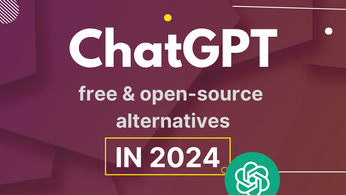Top 10 Notepad++ Alternatives for Linux Users
Table of Contents
Notepad++ is a favorite text and source code editor amongst developers and the general public but it is only available for use on Microsoft Windows. Fortunately, there are quite a few capable or even better Notepad++ alternatives for Linux. Let’s take a look at 10 Best Notepad++ alternatives for Linux.
10 Notepad++ Alternatives For Linux
1. Vim Editor
Vim is probably the most popular editor in the Linux community. It is a free to use and open-source editor which is very customizable. There are a ton of scripts available for Vim that allow you to do just about anything. An example is Fuzzyfinder which allows you to search for files or commands and the likes as you are typing them. Install it on Ubuntu and derivatives with the following command. sudo apt-get install vim

2. Notepadqq
Notepadqq is another Notepad++ alternative on Linux. Notepadqq is built to look exactly like Notepad++. It is also free and open-source. Install Notepad++ on Ubuntu with the following commands. There is support for anything you’d expect from your general text editor including color schemes, code folding, plugin support, and syntax highlighting for over 100 distinct programming languages. Install Notepadqq with the following command.

3. Gedit (Gnome text editor)
Gedit is a very simple and easy to use but nonetheless powerful general purpose text editor. It includes tools for editing source code and structured text such as markup languages. Some of its features include syntax highlighting, Auto indentation, text wrapping, line numbers, current line highlighting, bracket matching, spell checking, configurable fonts and colors, and plugin support.
Gedit comes pre-installed with Ubuntu.

4. SciTE
SciTE is a cross-platform editor that is also available on Linux. It is a very lightweight fast and a highly configurable editor. You can have customization for individual programming languages or projects over things like shortcuts and fonts. Note that most of these customizations are not available via GUI but by editing text configuration files. It may not look the nicest, but it gets the work done. Install SciTE with the following command.
sudo apt-get install scite
5. Sublime Text
Sublime Text is a sophisticated text editor for code, markup, and prose. It comes with a slick user interface, extraordinary features and amazing performance that will make you love it. It comes with some very good features including multiple selections, a distraction-free mode, split editing, command palette, instant project switch, plugin support and multiple selections which allow you to “make ten changes at the same time, not one change ten times”. Install Sublime Text with the following commands.

6. Geany
Geany is a text editor using the GTK+ toolkit with basic features of an integrated development environment. It was developed to provide a small and fast IDE with support for many filetypes. It comes with some features including code folding, symbol name auto-completion, code navigation, simple project management and support for plugins. Install Geany with the following command.
sudo apt-get install geany7. GNU Emacs
GNU Emacs has been called “the most powerful text editor available today” by some Linux enthusiasts. It comes with features like content-aware editing mode, complete built-in documentation, Unicode support for nearly all human scripts, code coloring and a packaging system for downloading and installing extensions. It is highly customized using Emacs lisp code or graphical interface. It has an entire ecosystem of functionality beyond text editing, including a project planner, mail and news reader, debugger interface, calendar, and more. Install emacs with the following command.
sudo apt-get install emacs
8. Atom
Atom is a text editor that’s modern, approachable, yet hackable to the core—a tool you can customize to do anything but also use productively without ever touching a config file. It comes out of the box with the following features, built-in package manager, smart auto-completion, file system browser, multiple panes, themes and a whole lot of customization and tweaks. Install Atom with the following code.
sudo add-apt-repository ppa:webupd8team/atom
apt-get update
apt-get install atom
9. GNU Nano Editor
GNU nano is a lightweight text editor that emulates the very popular Pico editor. Thus nano excels most in the Linux terminal. It comes with the following features, Autoconf support, goto-line# command w/o flag, Case sensitive search function, Interactive search and replace Autoindent ability and more. Nano comes as built in almost all of the Linux flavors.

10. KATE
The KDE Advanced Text Editor (Kate) is a multi-document text editor developed by the KDE free software community. It is quite powerful and comes with a host of features including MDI, window splitting and tabbing, spell checking, syntax highlighting and bracket matching, auto indentation, and auto-completion. Install KATE with the following command.
sudo apt-get install kate
Conclusion
There are over 100 text editors available in the Linux world. Every developer has their own favorite text editor and they choose them because of some factors that matter to them. Some will go for the simple ones, whiles others want the customization and features that some editors come with. Certainly one of these will suffice for you as an alternative to Notepad++. If I left out your favorite, share with us in the comments why you prefer that editor.
LinuxAndUbuntu Newsletter
Join the newsletter to receive the latest updates in your inbox.




